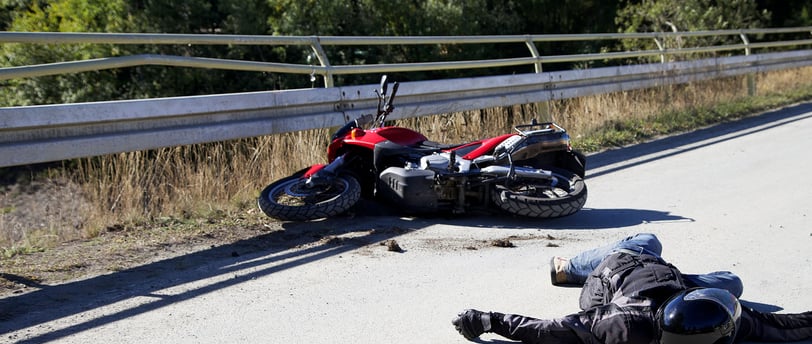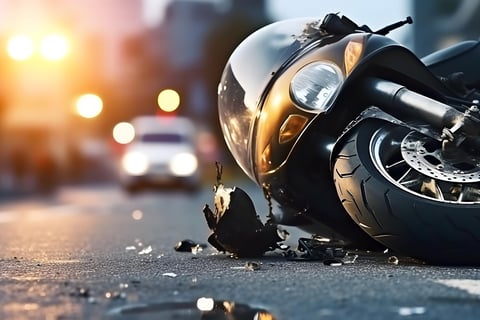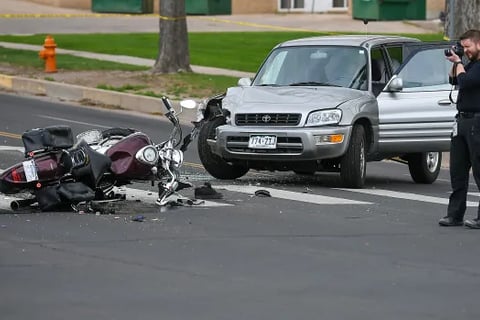Empowering Victims: Understanding Motorcycle Accident Compensation
Motorcycle accidents can be life-changing, both physically and financially. If you or a loved one has been involved in a motorcycle accident, understanding your legal rights and the compensation process is crucial. Victims may be entitled to compensation for medical expenses, lost wages, pain and suffering, and more. Navigating insurance claims and legal proceedings can be overwhelming, but knowing the key factors, such as fault determination and injury severity, empowers victims to seek fair settlements. Our guide breaks down the steps, helping you understand how to maximize your claim and rebuild your life after an accident.
GEAR
9/13/20246 min read


Impact of Motorcycle Accidents
Motorcycle accidents not only rock the lives of those involved but shake up society too. To make roads safer and improve compensation outcomes, it's important to get a grip on the economic fallout and what leads to these crashes.
The Money Mess
Getting tangled in a motorcycle accident can empty your pockets fast. Zanes Law highlights a jaw-dropping fact: motorcycle accidents are 29 times more likely to be fatal than car crashes. Imagine the financial chaos that follows! Victims end up buried under medical bills, lose income because they can't work, and might need to repair or replace their bikes. It's a financial headache that can dredge up long-term misery
What Causes These Wrecks?
Several factors crank up the chances of motorcycle accidents, and negligence is a biggie. Common culprits? Distracted driving, speeding, and driving while hammered, especially during those risky left-turns (Wagner Reese). Not yielding the right-of-way and reckless driving pour more fuel on the fire, boosting the financial damage of these crashes.


To get a clearer picture of the economic mess motorcycles crashes create, you gotta dive into motorcycle crash data. Spotting the trends and usual suspects in motorcycle accidents helps decision-makers introduce pinpointed measures to make roads kinder to motorcyclists (road safety for motorcyclists) and ease the financial sting of these brutal events.
Getting Paid After a Motorcycle Crash
So, you’ve had a bad day on your bike. Let’s talk about how to tackle your motorcycle accident compensation and make sure you’re not left holding the bag. We’ll cover economic damages, future losses, and the lowdown on settlements versus taking it to court.
Economic Damages
Calculating what you’re owed starts with economic damages. Think of it as getting paid back for all those bills that popped up because of the accident. Medical expenses, your busted bike, and lost wages are all part of this. It’s basically everything you can show a receipt for that’s drained your wallet.
Calculating Future Losses
Here’s where things get a bit number-heavy. Future losses mean figuring out the cash you still haven’t had to shell out yet, but will. This mostly involves your future earning capacity. If you're injured and can't work like you used to, that's a big deal. A good personal injury lawyer will probably rope in a money-whiz to show just how much you stand to lose over time. This boils down to 'present value', or what that future money is worth right now. This helps make sure your compensation package covers you long-term.
Settlement vs. Trial Value
Deciding between a settlement and going to trial is like picking between a fast food burger or a gourmet meal. Sure, a settlement might leave you a bit short, but you get it quickly and without the gamble of a trial. Opting for a trial means you can potentially get more since juries sometimes hand out more cash. But beware, it’s riskier, and you might end up with less. It's about balancing speed and certainty against the potential for a higher payout.
When it comes to pain and suffering, things get murky. How do you put a price tag on a lousy back or daily stress? Methods like the 'multiplier' or 'per diem' approach help. The multiplier method multiplies your proven economic damages by a number (usually between 1.5 and 5). The per diem method assigns a daily rate to your suffering and adds it up.
It can feel like you're learning a new language, but getting familiar with the dance between these damage calculations and settlement talks can put you in a much stronger spot. You'll be better prepared to get what you deserve, so you're not just patched up and sent on your way but properly compensated for every bit of your trauma.


Who's at Fault in Motorcycle Accidents?
Figuring out who’s responsible for a motorcycle crash can make or break your chance to get damages covered. Knowing the ins and outs of what causes these accidents can really sway the outcome of your claim. Let's look at driver carelessness, how states divvy up blame, and what it means to share faults in these cases.
Blame on the Driver
Carelessness is a biggie in most motorcycle crash cases. If someone doesn't drive safely and ends up hurting someone else, they usually have to pay for the damages . Often, the cause is car or truck drivers not paying enough attention to motorcyclists.
Contrary to what you'd think, reports show that passenger vehicle drivers are mostly to blame for these accidents. They might wrongfully think that motorcyclists are always the culprits, but reckless actions from car drivers usually spark these crashes.
Sharing the Blame
In a lot of states, motorcycle accident blame is split depending on how much each person messed up. If the rider did something wrong too, their payout might be cut down. This shared fault can change how much you end up getting.
The idea is to look at what everyone did wrong. Even if the rider had a part in the crash, they could still get compensated, just not as much. Knowing how shared blame works is super important if you’re hoping for a fair shake.
Who Gets How Much Blame
Courts look at what everyone involved did and give out blame accordingly. If both the rider and another driver were being unsafe, the court measures who did what . How much each is blamed changes who pays what and how much compensation you might get.
Things like injury severity, who followed traffic rules, and the crash details all factor in. Anyone caught in a motorcycle accident should learn how fault is doled out. This affects the pay-out big time. Getting help from seasoned motorcycle accident lawyers can guide you through the tough bits and boost your chances for a fair deal.
Getting What You Deserve After a Motorcycle Crash
If you've been in a motorcycle accident, going after compensation for your losses needs to be part of your recovery plan. Knowing what's up for grabs can smooth out your ride through the legal jungle. The big three to look out for are special damages, lost earning power, and pain and suffering cash.
Special Damages
Special damages, or what you might call payback for out-of-pocket expenses, take care of the bills that piled up right after the accident. We're talking medical costs, wrecked bike repairs, lost workdays, and other stuff you had to shell out for because of the crash.
To get this money back, make sure you save everything—medical bills, repair receipts, and anything else you paid for because of the accident. The more proof you have, the stronger your argument is for getting paid back.
Lost Earning Power
If the crash messed up your ability to clinch that paycheck, you should be looking at compensation for lost earning power. This covers how the injury affects your job now and down the line. They'll look at things like your age, education, skills, and how bad you're hit to see what you could be missing out on.
Get your hands on documents like tax returns, social security records, and work files. Medical opinions also help show the whole picture. Sometimes, bringing in an economic expert to explain the future financial hit can drive the point home to insurance folks or a jury.
Pain and Suffering
Then there's the whole pain and suffering angle. This chunk of cash is for the physical pain and emotional rollercoaster the crash threw you on. It's all about your personal experience and can be tricky to price out.
They'll consider how bad the injury is, the treatment you need, and how it's messing with your everyday life. Keeping a journal of your pain, medical records, and statements from family and friends can be golden when you're arguing for this kind of compensation.
Understanding these compensation types can help you talk the talk when it comes to your rights and the financial help you need to get back on track. Don't go it alone—team up with a good personal injury lawyer who can steer you through the legal maze and make sure you get what's fair and square.
The Importance of Wearing Gear
Wearing proper motorcycle gear isn’t just for long rides—it's essential every time you hit the road, even for short trips. Protective gear can mean the difference between walking away with minor injuries or facing life-threatening consequences after a crash. Helmets, gloves, jackets, and boots create a shield between you and the pavement, reducing the risk of serious injuries like road rash, fractures, or head trauma.
Recommendations:
Helmet: Always wear a DOT-approved helmet to protect your head.
Jacket and Pants: Choose gear made from abrasion-resistant materials like leather or Kevlar.
Gloves: Protect your hands from impact and friction burns.
Boots: Opt for ankle-covering boots with non-slip soles for better control.
Reflective Gear: Boost visibility with bright, reflective materials for day and night riding.
Wearing the right gear isn’t just about safety—it’s about survival.